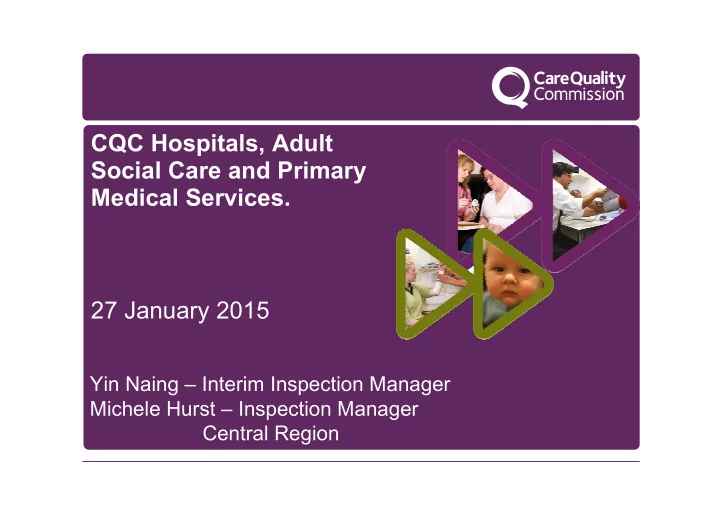

CQC Hospitals, Adult Social Care and Primary Medical Services. 27 January 2015 Yin Naing – Interim Inspection Manager Michele Hurst – Inspection Manager Central Region
Our purpose and role Our purpose We make sure health and social care services provide people with safe, effective, compassionate, high-quality care and we encourage care services to improve Our role We monitor, inspect and regulate services to make sure they meet fundamental standards of quality and safety and we publish what we find, including performance ratings to help people choose care We will be a strong, independent, expert inspectorate that is always on the side of people who use services
The new CQC inspection programme Larger inspection teams including specialist inspectors, clinical experts , and experts by experience We will use intelligent monitoring to decide when, where and what to inspect. Inspections will focus on our five key questions about services KLOEs (key lines of enquiry) as the overall framework for a consistent and comprehensive approach Strong focus on talking and listening to staff and patients Ratings to help compare services and highlight where care is outstanding, good, requires improvement and inadequate Quality summit is held with the provider and stakeholders to launch quality improvement process for hospitals Risk summits are also held in PMS
Our key questions Our focus is on five key questions that ask whether a provider is: Safe? – people are protected from abuse and avoidable harm Effective? – people’s care, treatment and support achieves good outcomes, promotes a good quality of life and is based on the best available evidence Caring? – staff involve and treat people with compassion, kindness, dignity and respect. Responsive? – services are organised so that they meet people’s needs Well-led? – the leadership, management and governance of the organisation assure the delivery of high-quality care, supports learning and innovation, and promotes an open and fair culture.
8 Core Services � In acute hospitals the following 8 core services are always inspected: 1. Urgent and emergency services 2. Medical care (including older people’s care) 3. Surgery 4. Critical care 5. Maternity and gynaecology 6. Services for children and young people 7. End of life care 8. Outpatients and diagnostic imaging � We will also assess other services if there are concerns (e.g. from complaints or from focus groups) � The inspection team splits into subgroups to review individual areas, but whole team corroboration sessions are vital
Primary Medical Services In PMS the following population groups are always inspected. 1. Older people 2. People with long term conditions 3. Families, children and young people 4. Working aged people( including those recently retired and students) 5. People whose Circumstances may make them vulnerable 6. People experiencing poor mental health ( including people with dementia) 7. To be noted some practices only cater for specific patients for example - Homeless 6
Inspection teams Hospitals � Chair – Senior clinician or manager � Team Leader � Doctors (senior and junior) � Nurses (senior and junior) � AHPs/Managers � Experts by experience (patients and carers) � CQC Inspectors � Analysts Around 30 people for a DGH more for a multi-site trust or a combined acute/community trust
Inspection teams Primary Medical Services • Lead Inspector – always present • GP specialist – always present for comprehensive inspections but not always required for focused inspections • Practice Nurse Specialist – dependant upon the inspectors judgment • Practice Manager Specialist - dependant upon the inspectors judgment • Expert by experience - dependant upon the inspectors judgment • Pharmacist inspector – provides advice on the data pack prior to inspection and may inspect too if risk is high. Can inspect independently if needed for example a focused inspection. • Inspection managers – to carry out supervision as part of the ongoing performance management process for the inspectors. 8
Adult Social care inspection. Lead Inspector – Always Specialist inspector – Always Expert by experience Pharmacy inspector – where required. 9
Rating four point scale High level characteristics of each rating level Innovative, creative, constantly striving to improve, open and transparent Consistent level of service people have a right to expect, robust arrangements in place for when things do go wrong May have elements of good practice but inconsistent, potential or actual risk, inconsistent responses when things go wrong Significant harm has or is likely to occur, shortfalls in practice, ineffective or no action taken to put things right or improve
How we rate � Ratings take account of all sources of information: ► Intelligent monitoring tool ► Information provided by trust ► Other data sources ► Findings from site visits: - Direct observations - Staff focus groups - Patient and public listening events - Interviews with key people � Bottom up approach: each of the 8 core services and population groups are rated on each of the five key questions (safe, effective, caring, responsive, well led). � Where trusts and practices have more than one location and provide services on different sites we rate these separately. � We then rate the trust as a whole on the five key questions, with an overall assessment of well-led at trust level. � We then derive a final overall rating.
NHS acute hospitals Primary Medical Services and Adult Social Care handbooks
• Hospital inspections mental health and general and independent health care • Primary Medical Services • Dental inspections • General Practice inspections • Health services provided to prisons • Youth and Justice inspections • Children's safeguarding inspections • Thematic inspections • Integrated Services inspections • Adult Social Care • Care homes with and without nursing • Domiciliary care agencies • Further information is available at www.cqc.org.uk 13
Recommend
More recommend